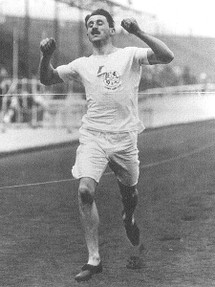 Nowhere was the clash between Irish-Americans and the British more apparent than in the 400 meters race. There were only four participants in this - an upper crust Englishman and three US athletes.
Nowhere was the clash between Irish-Americans and the British more apparent than in the 400 meters race. There were only four participants in this - an upper crust Englishman and three US athletes.
For days, leading up to it, the British press had whipped the public up into a frenzy of anti-American feeling. Newspaper journalists proclaimed that the Americans would cheat, ganging up on England's Wyndham Halswelle, blocking his progress or elbowing him as they ran.
By the time the four runners lined up at the starting block, the whole stadium crowd was hostile with all eyes watching for unsporting behavior. Worst still, Britain's Olympic officials seemed to have bought into all of the hype. Wardens were positioned at regular intervals all along the track. They were openly there to scrutinize the Americans during the race.
All was tense but well until close to the finishing line. John Carpenter, an American athlete, ran wide before Halswelle. It was a tactic which was legal under US rules, but not British Olympic standards.
Halswelle reared backwards. A warden screamed 'foul' and declared that he'd seen elbows being used. Carpenter denied it (and later, during the inquiry, Halswelle confirmed the American's innocence). But the ribbon was pulled back before anyone could run through it.
Officials stormed onto the track, but it wasn't Carpenter who was man-handled from it. It was another of the US athletes, John Baxter Taylor Jr, who was grabbed. He was one of the earliest black people to represent America on the international stage.
Racism had meant that he'd received more than his fair share of elbows in the past, so it was his wont to lag behind during the race, then win with a sudden spurt of speed at the end. Slightly behind his countrymen, he was an easy target for the British umpires, who dragged him off.
The third American athlete, William Robbins, witnessed it all and stopped running in pure indignation. He protested there on the track, but to no avail. The 400 meters race had been declared void.
None of the three US entrants were allowed into the inquiry, though Halswelle was allowed to give evidence. It was ruled that the race would begin again, but with Carpenter disqualified. Taylor and Robbins both refused point blank to run without him, but the boycott did not move the officials.
Only Halswelle arrived at the starting line for the official 400 meters. He ran it alone and took the medal for the United Kingdom. The British press recorded the incident as only right and proper. The American press naturally took the opposite view.
As a result of the debacle of this particular race, all future ones were held with lanes painted onto the track.



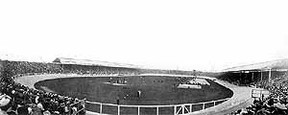 Head west out of London, past Kensington Gardens and the magnificent palace, and over the brow of Notting Hill. You will arrive in Shepherd's Bush.
Head west out of London, past Kensington Gardens and the magnificent palace, and over the brow of Notting Hill. You will arrive in Shepherd's Bush.


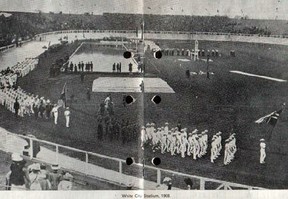 The Stars and Stripes was missing from the mass of flags flying around White City. No-one claimed responsibility for that. The official response was that the absence of the American colors was an 'unfortunate accident'.
The Stars and Stripes was missing from the mass of flags flying around White City. No-one claimed responsibility for that. The official response was that the absence of the American colors was an 'unfortunate accident'.


 Nowhere was the clash between Irish-Americans and the British more apparent than in the 400 meters race. There were only four participants in this - an upper crust Englishman and three US athletes.
Nowhere was the clash between Irish-Americans and the British more apparent than in the 400 meters race. There were only four participants in this - an upper crust Englishman and three US athletes.
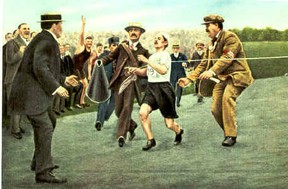 The distance between Windsor Castle and the track finishing line at White City Stadium was exactly 26 miles and 385 yards (42.195km) long.
The distance between Windsor Castle and the track finishing line at White City Stadium was exactly 26 miles and 385 yards (42.195km) long.
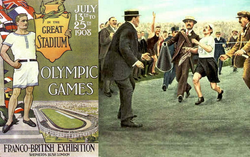

 St Tydecho's Churches in West Waleson 09/03/2014
St Tydecho's Churches in West Waleson 09/03/2014
 Goodies for an Outlander Premiere Partyon 03/06/2015
Goodies for an Outlander Premiere Partyon 03/06/2015
 Holocaust Memorial Day Interview with Rainer Höss, Grandson of Rudolf Architect of Auschwitzon 01/24/2015
Holocaust Memorial Day Interview with Rainer Höss, Grandson of Rudolf Architect of Auschwitzon 01/24/2015
 Romantic Valentine Gifts for an Outlander Fanon 01/16/2015
Romantic Valentine Gifts for an Outlander Fanon 01/16/2015

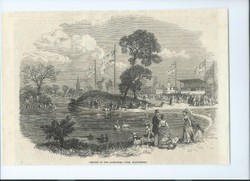
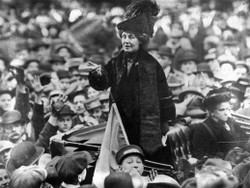
Comments
I've just come back from Dorset. Some of the boating events are happening down Weymouth. There are so many new roads built or being built down there!
Should be exciting. :)
i can't wait for the London 2012 Olympics
I don't know. The soap opera sounded quite interesting too!
Let's hope that this year's Olympic Games is a bit more about the sport!
He became a massive celebrity afterwards, even in America. He went from this little village in Italy to being invited to all these high society parties on both sides of the Atlantic. He even competed in more marathons in the US, but not with this kind of drama. :)
I don't know if Pietri should be praised or certified.